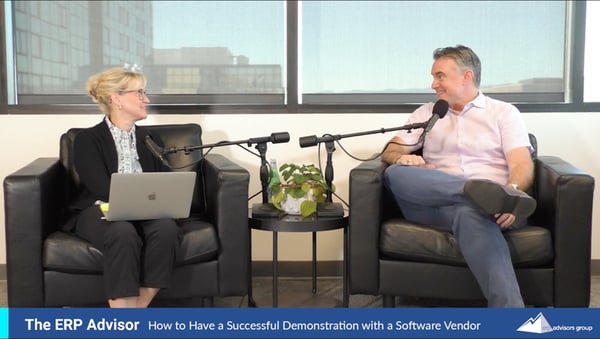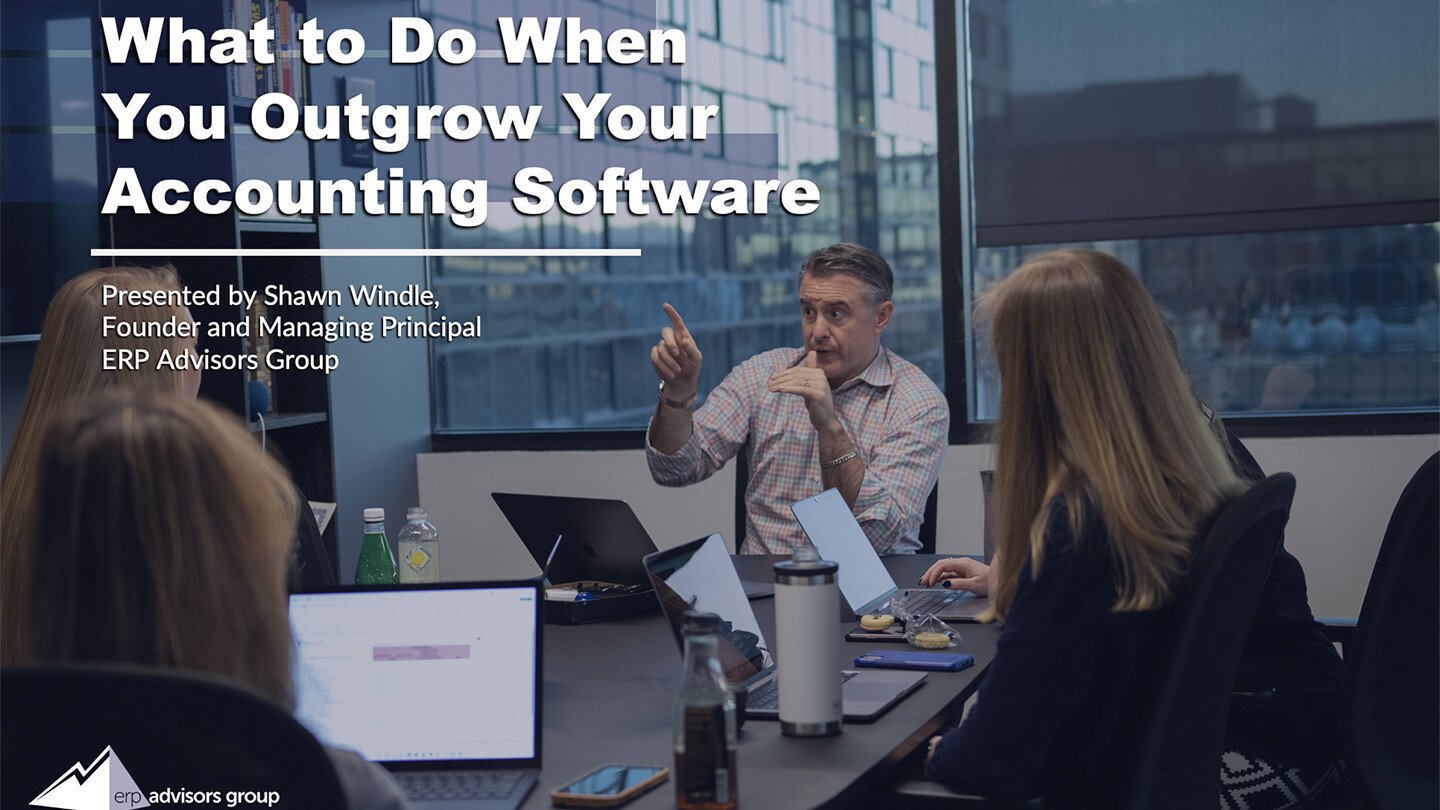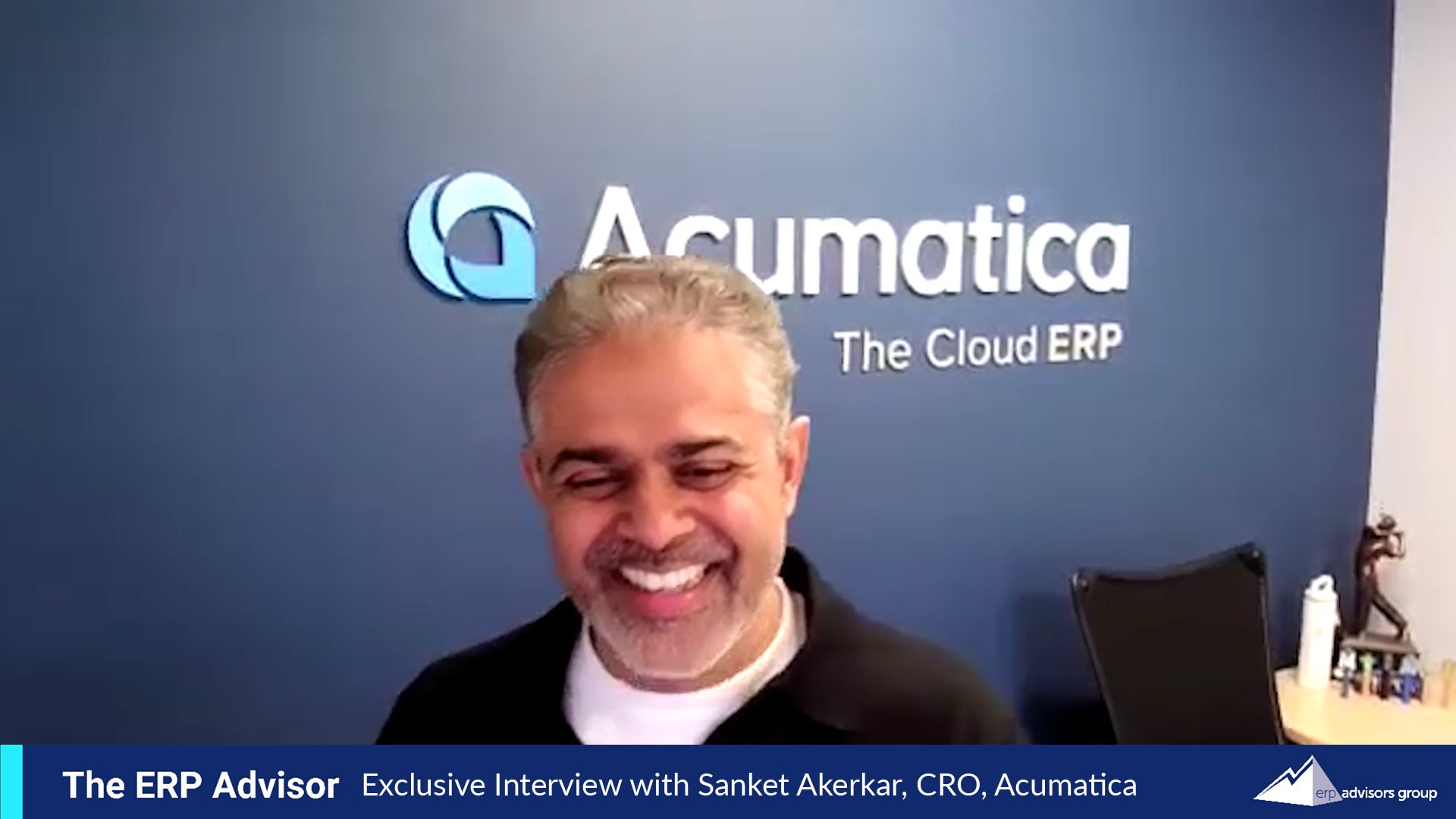
Holding a successful ERP demonstration can be tricky for the selection novice. From vendor preparation to writing a demo script, each detail can mean the difference between seeing how your needs can be met in a product and accidentally dismissing a worthy vendor. In this EAG Selection Mini-Series episode, ERP expert, Shawn Windle, will advise ERP selection leaders on conquering software demonstrations to reach their ERP selection goals. Stick around to the end of this blog for a free download with specific questions to ask your ERP vendor!
How to Have a Successful Demonstration with a Software Vendor
In order to determine the right solution for your business, you need to see it in action! That is where the importance of software demonstrations takes center stage. A successful demonstration with an ERP software vendor takes preparation, therefore, project sponsors must carefully evaluate potential vendors and show only the best solutions to their colleagues.
How to Prepare for a Software Demo
Project sponsors must build awareness around their requirements and the available solutions on the market. Supplement your own research by contacting colleagues in your specific industry to find out their experience and knowledge of recent ERP efforts, whether positive or negative. It is vital for businesses to develop an understanding of their needs, as well as the product they will be demoing to ensure time is not wasted on unnecessary features or ill-fitting products. ERP means something different to everyone, thus each vendor is completely different in the features it offers and how it offers them. Almost all vendors will have basic offerings in place, such as financial management or distribution capabilities, but the way that they offer these functions will vary. Therefore, your business requirements will dictate your software selection path.
It is also imperative to equip your team with the confidence to ask questions and the keywords to look out for during the demo process, such as “ISV”, “heavy configuration”, “third-party bolt-on”, and more. When “software” language is used, it is important for participants to stop and ask for clarification on the exact meaning of each piece and its impact on the project.
Frankly, education is the single most important building block when preparing for a software demonstration. With the right education in place, you can rest easy knowing you have properly equipped your team to participate in demos and ultimately select the right solution.
Hold In-Person Demos
Consider pulling your team together as a group to preview software product demonstrations together. This can improve your team’s participation and accountability and the consequent results of getting their consensus, feedback, and buy-in. When employees are attending the demonstration remotely, they may not give their full attention to the presentation and be handling emails or other normal work cycles. When coordinating your demo, consider the following factors:
- Are the participants actually going to pay attention?
- How much do you value stakeholder feedback?
You want to be absolutely certain that you have key stakeholders’ attention, so hosting the demo in person may encourage participant engagement, however, laptops still make distraction during the demo a likely risk. Ultimately, you will not be able to eliminate all distractions, so do what is best for your business to maximize participation.
Hosting the demos in person is also beneficial because it allows you to carefully observe the dynamics and dialogue of the people in the room. Interaction will be the driving force in moving the project forward and the demo is only the beginning of a long period of collaboration, so if there is no interaction, that can be a negative indicator. The communication lines during the demo should be effective, open, and pleasant. It is also important to meet potential implementation resources during the process to ensure that your business enjoys working with those individuals, not just the sales team. Handling the sales team is crucial, but ultimately, the sales team goes away after the contracts are signed. Meeting the implementation resources is usually reserved for final due diligence, but it is a valuable step, so don’t back off from requesting it. These individuals will be the ones who will deliver your implementation. Feeling out their capabilities, success with similar clients, and general attitude towards you and your company can make the difference between success and failure with your ERP upgrade.
Many vendors like to present their demonstrations in person. You may opt to do your first round with them remotely when the field of vendors is larger and then only bring the most viable ones to meet you and your team in person once you have narrowed it down to two or three. The way that they carry themselves will show you their character and give you key insights into their operations. It is the small things like if the vendor is on their phone the entire time or is glossing over your team’s questions that could be a red flag.
Who to Invite to the Demo
Most businesses naturally gravitate towards forming a steering committee which consists of their Subject Matter Experts, Department Heads, or key stakeholders who represent core parts of the business. These are the leaders in your business who will ultimately be responsible for a successful ERP implementation. Therefore, they are the core people who are normally involved in vendor demonstrations. Generally, you do not need to survey all end users for the acceptability of the final product.
Ideal Company Setting
Avoid scheduling the demo on a Monday or Friday as most people will likely be organizing for the week, or simply checked out. Also, don’t schedule the demo until an hour after your company’s normal “start” time. This allows employees to get settled in for the day before devoting their time to a multiple-hour demo.
You Control the Vendor's Agenda
A vendor who can actually meet your business’s needs should be able to adequately show that in a reasonable amount of time. Some vendor salespeople may rely too much on “slideware” rather than the product demonstration. While it is understandable the vendor team wants to introduce the company and explain its overall fit and position in the marketplace, spending more than 15 minutes in PowerPoint will spark disinterest, and unintentionally lose the client team before the demonstration even starts. So get your vendor’s agreement to limit introductions and PowerPoint.
Provide your vendors with some kind of demonstration script that has key requirements by business process area. Make sure to tell the vendor what is unique about each area and guide them to show some functions across each part of the software. Provide vendors ample time for preparation so they can comprehend your business and convert that into a relevant demonstration for your business. But don’t give them too long. If they need weeks and weeks to prepare, then it could be a red flag – whether it is product fit, services team fit, or understaffing.
And help prep the ERP software vendor so they know your company “lingo.” For instance, if you are a professional services firm but you do not do any time entry or billings based on time, make sure the vendor understands that and does NOT feature that during the demonstrations or they will alienate your users. While you can let them show some KPIs, dashboards, and reports, ensure they will show some features across the entire product and won’t focus solely on the “gee whiz” things.
An easy way to reduce the time spent in a demo is to remove repetitive functionality from the review, such as basic accounting capabilities, that would detract from core requirements needing to be addressed.
Why Do Demos Go Poorly & What to Do If a Demo Sours
A demo can go poorly for any number of reasons, from an ill-prepared sales team to technical problems or the wrong fit, so it is vital to understand why these problems occur, what to do when they arise, and whether or not the mistake warrants removing the vendor from your shortlist. Things do happen, so you have to be understanding, but you must also evaluate the vendor’s preparation and reaction to the obstacle. The best software salespeople will have contingency plans in place to combat potential mistakes during a demo, while others will fall short and will display their poor ability to rebound.
These mistakes and moments will come down to your team’s tolerance and the vendor’s ability to take responsibility in moments of high stress (another key indicator for how they would react during the implementation itself!) If it happens once and they course correct, do not dwell on the mistake, but if something continues to happen over and over again, it is a major red flag. This is especially true if the vendor continues to cancel, reschedule, or make excuses simply because they are busy or prioritizing other projects.
Demo mishaps may also be attributed to an individual software salesperson, and not the vendor or product itself. Parts of the demo may be great, but a bad demo person could ruin everything. If your project sponsor notices the salesperson unfairly representing the product, they should immediately end the demo. At that point, it is best to allow participants to leave and then have a difficult conversation with the vendor, communicating that they seem ill-prepared or lost, and then see what they say. Their response will be a key indicator of their willingness to take responsibility and some vendors may even take themselves out of the running if they no longer believe it is a good fit, which is also where basic honesty comes into play.
Other demonstrations can go south because the product actually cannot do the functions you need it to. Occasionally during a demo, a vendor will switch from a live product demonstration over to PowerPoint slides to “demonstrate” functionality. Be very wary because this may mean the solution is only theoretical and not already functional and proven.
We have seen demos completely fail, but the product was able to come back to win due to the honesty and attitude of the sales team. So, if you walk away with anything from this article, it is to judge the vendor based on their character, responsibility, and reactions to mistakes.
Conclusion
There isn’t a strict guide that will lead to a victorious demo, but these considerations can help ensure vendors and your team are properly equipped to have a positive ERP demonstration. By applying these tips, you can conduct a software demonstration like the experts. If you need more help, schedule a free consultation with our ERP Selection Consultants, today!





